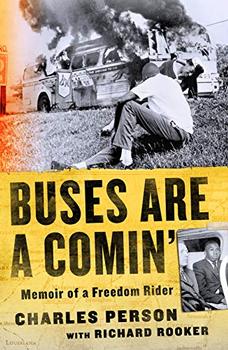Summary | Excerpt | Reading Guide | Reviews | Beyond the book | Read-Alikes | Genres & Themes | Author Bio

Memoir of a Freedom Rider
by Charles Person, Richard RookerA firsthand exploration of the cost of boarding the bus of change to move America forward - written by one of the Civil Rights Movement's pioneers.
At 18, Charles Person was the youngest of the original Freedom Riders, key figures in the U.S. Civil Rights Movement who left Washington, D.C. by bus in 1961, headed for New Orleans. This purposeful mix of black and white, male and female activists―including future Congressman John Lewis, Congress of Racial Equality Director James Farmer, Reverend Benjamin Elton Cox, journalist and pacifist James Peck, and CORE field secretary Genevieve Hughes―set out to discover whether America would abide by a Supreme Court decision that ruled segregation unconstitutional in bus depots, waiting areas, restaurants, and restrooms nationwide.
The Freedom Riders found their answer. No. Southern states would continue to disregard federal law and use violence to enforce racial segregation. One bus was burned to a shell; the second, which Charles rode, was set upon by a mob that beat the Riders nearly to death.
Buses Are a Comin' provides a front-row view of the struggle to belong in America, as Charles leads his colleagues off the bus, into the station, into the mob, and into history to help defeat segregation's violent grip on African American lives. It is also a challenge from a teenager of a previous era to the young people of today: become agents of transformation. Stand firm. Create a more just and moral country where students have a voice, youth can make a difference, and everyone belongs.
The lion's share of the narrative concerns the Freedom Rides, but every chapter is peppered with references to other important moments and people in the Civil Rights Movement, as well as ties to current events such as the murder of George Floyd and Colin Kaepernick's taking a knee at NFL games. As such, the book is not only a memoir and a snapshot of a critical juncture in America's history, but extremely relevant to our current state of affairs. Person's prose flows smoothly between these subjects in a conversational tone; the fact that his account is so evidently personal heightens its impact on the audience...continued
Full Review
 (953 words)
(953 words)
(Reviewed by Kim Kovacs).
 In his memoir Buses Are a Comin', Charles Person explains that he got involved with the American Civil Rights Movement of the 1950s-1960s through fellow students at his school, Morehouse College, which is one of the country's oldest Historically Black Colleges and Universities (HBCUs).
In his memoir Buses Are a Comin', Charles Person explains that he got involved with the American Civil Rights Movement of the 1950s-1960s through fellow students at his school, Morehouse College, which is one of the country's oldest Historically Black Colleges and Universities (HBCUs).
The HBCU designation was created by the Higher Education Act of 1965, which defines an HBCU as "any historically black college or university that was established prior to 1964, whose principal mission was, and is, the education of black Americans, and that is accredited by a nationally recognized accrediting agency or association."
The first all-Black institute of higher learning in the American South was Shaw University, founded in Raleigh, North...

If you liked Buses Are a Comin', try these:

by Karen Valby
Published 2025
The forgotten story of a pioneering group of five Black ballerinas and their fifty-year sisterhood, a legacy erased from history—until now.

A Passionate Mind in Relentless Pursuit
by Noliwe Rooks
Published 2024
An intimate and searching account of the life and legacy of one of America's towering educators, a woman who dared to center the progress of Black women and girls in the larger struggle for political and social liberation.